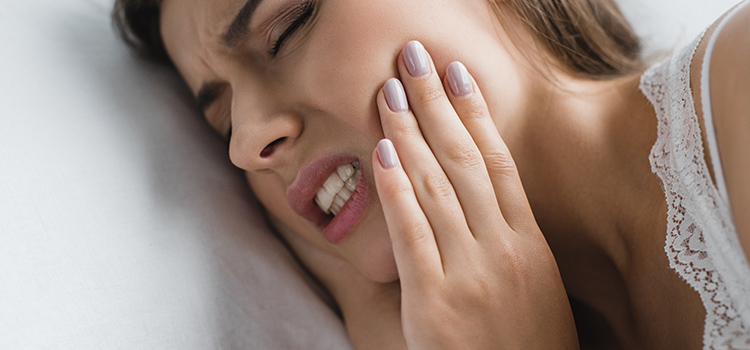Do you grind or clench your teeth during your sleep? This condition is called bruxism and because it happens during your sleep, you may not be aware of it. Bruxism is typically detected by your dentist during a routine dental check up and they may recommended the use of a nightguard to help protect your teeth, gums and jaws.
A nightguard is a type of mouthpiece that is designed to be worn at night. After stress reducing techniques, it is the most common and simplest treatment for bruxism.
What causes bruxism?
The exact cause(s) is unknown, however the following conditions are associated with an increased risk of bruxism:
- Daytime stress and anxiety
- Poor posture
- Malocclusion (misaligned bite)
- Temporomandibular joint disorder (TMD)
- Sleep apnea
- Diet high in caffeine and sugar
- Family members with sleep bruxism
Signs and symptoms of Sleep Bruxism
- Teeth grinding and jaw clenching during sleep (often loud enough for a partner to hear)
- Loose, chipped, broken, fractured, or flattened teeth
- Worn tooth enamel
- Receding gums
- Tooth sensitivity or pain
- Sore, tired, or tender jaw muscles
- Locked jaw or trouble opening or closing your mouth
- Clicking or popping in the jaw
- Neck, jaw, or face pain and soreness
- Pain that feels like an earache
- Frequent headaches (especially in the morning)
- Damaged cheek tissues
- Disrupted sleep and daytime grogginess
What nightguard should I get?
Using the right nightguard is essential. A nightguard that is retentive, functional, and comfortable to wear will be most effective at treating bruxism. A nightguard should cover an entire arch. Never use a “partial coverage” nightguard as it can cause unwanted bite changes, and worsen your symptoms. Consult with your dentist to learn more about what options are available, and what will work best for you.
Are you waking up with pain or tenderness around your jaws? You may be clenching your teeth at night. Don’t wait, contact us to schedule a consultation for a nightguard.

